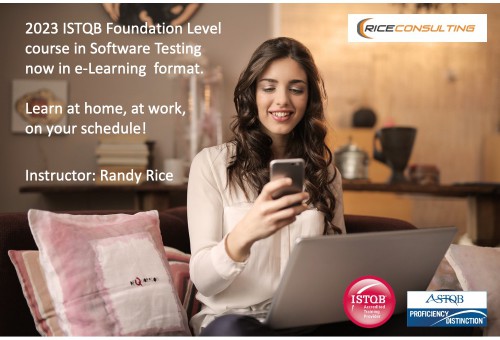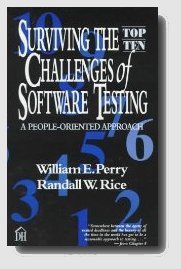 You need three essentials for an effective software testing program:
You need three essentials for an effective software testing program:
1. An effective, workable process
2. Trained and motivated people
3. Tools that give you leverage
It takes all three of these components working together in a balanced way to make testing effective.
You have probably experienced the frustration of trying to do a good test without tools, a process, or the right people.
That's where I come in! I can't wave a magic wand over your people or your processes to make them change overnight, but we can help you do some very important things to improve your testing efforts:
Learn where you are right now in test practices.
Self-assessments are somewhat helpful, but not very objective. An external, objective assessment can identify gaps that perhaps you have overlooked. In addition, the "outside expert" carries weight with senior management and can reinforce the information that you have known for years.
In 1994, I developed one of the very first Software Testing Maturity Assessments. Since that time, I have matured this assessment based on the maturing of the testing industry and the best practices seen in the organizations he has assessed. I can also perform other types of testing assessments, such as the one based on the Test Maturity Model. This assessment is quick, effective and accurate. To learn more, contact us here.
Plan where you need to be.
It's possible to over-test, just as it is possible to under-test. I will work with you to balance scope, schedule, cost, quality and risk to arrive at a testing process that fits your needs. I have plenty of frameworks and templates, but we do not use a cookie-cutter approach to process design. My philosophy is that people only embrace what they help to create. You are always in control and have a lot of input to the test process design.
Plan how to get where you want to be.
I work with you to develop a plan that transitions from where you are to where you need to be. In some cases, this plan is a phased approach to allow time for the culture to accept change. In other situations, the changes may be easy and quick, yielding high results.
Support along the journey and afterwards.
Process improvement has many pitfalls. Otherwise, every organization would have great effective processes. I can help you avoid or overcome the pitfalls and accelerate your progress. After your processes are in place, we are always there to answer any questions and provide any resources and services. Whether it be informal mentoring or formal training, I can help keep you on track!
Know how well you are doing.
You will need a way to judge your progress. I can help you take the right metrics to know how effective the process changes are, and if adjustments are needed. My philosophy about test metrics is that they are helpful to know how you are progressing. However, it is possible to skew metric information and overdo the metrics effort. I will show you the few essential metrics that you can use to get the most information with the least effort. As I often say, "The goal of measurement is not to measure things - it's to improve them." As Bill Hufschmidt says, "Quality without metrics is just cheerleading."
Would it surprise you to know that even small process improvements can result in efficiency gains of 10% or more? It's true. You can see a lot of improvement with some minor changes.
What would you do with an extra 10% in terms of resources, budget or time?
Contact us today and I will be happy to discuss with you how to start on your own road to better testing.













